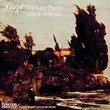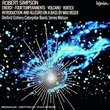| All Artists: Johannes Brahms, Elly Ameling, Rudolf Jansen Title: Elly Ameling: Songs by Brahms Members Wishing: 1 Total Copies: 0 Label: Hyperion UK Release Date: 3/23/1993 Album Type: Import Genres: Pop, Classical Styles: Vocal Pop, Historical Periods, Baroque (c.1600-1750) Number of Discs: 1 SwapaCD Credits: 1 UPC: 034571164441 |
Search - Johannes Brahms, Elly Ameling, Rudolf Jansen :: Elly Ameling: Songs by Brahms
CD DetailsSimilar CDs |
CD ReviewsElly Ameling Sings Brahms Robin Friedman | Washington, D.C. United States | 07/27/2008 (5 out of 5 stars) "This CD features one of the greatest lyric singers of our age, Elly Ameling, singing songs of Brahms. Unfortunately the CD is out of print. But it remains a collection to be treasured. Ameling's recordings, together with those of Fischer-Dieskau, offer outstanding interpretations of the lieder of Brahms.
Johannes Brahms (1833 -- 1897) composed over 200 songs over his career. The songs show a more personal,lyrical side of the composer than do his larger works. Brahms rarely raises his voice in his songs. Instead, the songs exhibit a quiet intensity with their frequent themes of lost love and loneliness. Many of Brahms's songs show the influence of folk themes. Many of the settings involve nature, lakes, forest, meadows, the seasons of the year. Elly Ameling recorded Brahms several times during her long career. This CD on Hyperion dates from 1990, five years before Ameling retired from the concert stage. Ameling is in beautiful voice. More importantly, she sings these simple songs with the understanding and feeling that come from maturity. The Dutch pianist Rudolf Jansen accompanies Ameling. Ameling performs 23 songs from all stages of Brahms's career. The CD includes Brahms' earliest song, "Liebestru", opus 3 no 1 composed in 1852 when the composer was a young man of twenty. Robert Schumann wrote of this opus 3 set that "there were songs whose poetry would be clear even if one were ignorant of the words, though a profound singing melody runs through them all." Ameling offers two songs from Brahms's rarely performed song-cycle, "Die Schone Magelone" opus 33 setting poems by Ludwig Tieck. This cycle occupied Brahms intermittently from 1861 -- 1868. The poems have a medieval setting and tell of a romance between a knight and his lost love. Ameling performs song 9 from the cycle, a love song called "Rest thee my Lady" and the sad song of farewell, no. 12 in the cycle, "Must we then once more be parted." Ameling also performs songs Brahms composed late in his life including "The Hunter", opus 95, no 4, an uptempo work composed while Brahms was struggling with his Fourth Symphony, "It seems as through Melodies", opus 105 no. 1, with a theme derived from Brahms's A major violin sonata, "The Nightingale" opus 97 no. 1, one of the relatively few Brahms's songs in which the music attempts to paint the text (the song of the bird) and the bleakly set "The Hoar-Frost Hangs" opus 106 no.3. Some of my favorite songs from this collection are the sad love songs "Cool Wood" opus 72 no. 3 and "Your Blue Eyes" opus 59 no. 8. In "My Love is Green" opus 63 no 5, Brahms set with great passion a poem composed by Felix Schumann, the youngest son of Clara and Robert. "May Night" opus 43 no.4 is a song of loneliness while in "Terese" opus 86 no. 6, Brahms captures the voice of a young woman coquettishly trying to bring out her would-be suitor. For those fortunate enough to acquire it, this CD includes excellent notes by Julian Haylock on each of the songs together with texts and translations. Robin Friedman " |



